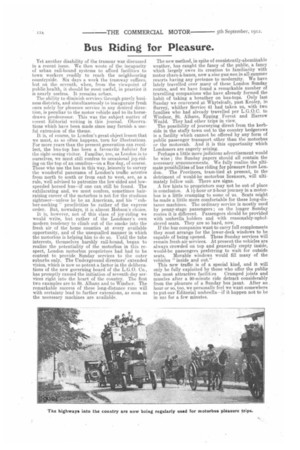Bus Riding for Pleasure.
Page 14

If you've noticed an error in this article please click here to report it so we can fix it.
Yet another disability of the tramcar was discussed in a recent issue. We then wrote of the incapacity of urban rail-bound systems to afford facilities to town workers readily to reach the neighbouring countryside. Six days a week the tramway suffices, but on the seventh, when, from the viewpoint of public health, it should be most useful, in practice it is nearly useless. It remains urban.
The ability to diminish services through purely business districts, and simultaneously to inaugurate fresh ones solely for pleasure service in any desired direction, is peculiar to the motor vehicle and to its horsedrawn predecessor. This was the subject matter of recent Editorial writing in this journal. Observations which have been made since may furnish a useful extension of the theme.
It is, of course, to London's great object lesson that we must, as so often happens, turn for illustrations. For more years than the present generation can recollect, the bus-top has been a favourite habil at for the sight-seeing visitor. Familiar, too, as London is to ourselves, we must still confess to occasional joy.-riding on the top of an omnibus—on a fine day, of course. Those who use the bus in this way, leisurely to survey the wonderful panorama of London's traffic arteries from north to south or from east to west, are, as a rule, well advised to patronize the low-sided and lowspeeded horsed bus—if one can still be found. The exhilarating and, we must confess, sometimes hairraising career of the motorbus is not for the studious sightseer—unless he be an American, and his " rubber-necking " proclivities be rather of the express order. But, nowadays, it is almost Hobson's choice.
It is, however, not of this class of joy-riding we would write, but rather of the Londoner's own modern tendency to climb out of the smoke into the fresh air of the home counties at every available opportunity, and of the unequalled manner in which the motorbus is helping him to do so. Until the tube interests, themselves harshly rail-bound, began 'to realize the potentiality of the motorbus in this respect, London motorbus proprietors had had to be content to provide Sunday services to the outer suburbs only. The Underground directors' extended vision, which is now so potent a factor in the deliberations of the new governing board of the L.G.O. Co., has promptly caused the initiation of seventh-day services right into the heart of the country. The first two examples are to St. Albans and to Windsor. The remarkable success of these long-distance runs will with certainty lead to further extensions, as soon as the necessary machines are available.
The new method, in spite of consistently-abomifiable weather, has caught the fancy of the public, a fancy which largely owes its creation to familiarity with motor chars-à-banes, now a sine qua non in all summer resorts having any pretence to modernity. We have lately travelled over many of these London Sunday routes, and we have found a remarkable number of travelling companions who have already formed the habit of taking a breather on bus-tops. Only last Sunday we conversed at Whyteleafe, past Kenley, in Surrey, whither Service 61 had taken us, with two families who had already travelled per L.G.0.0. to Windsor, St. Albans, Epping Forest and Harrow Weald. They had other trips in view.
The possibility of journeying direct from the kerbside in the stuffy town out to the country hedgerows is a facility which cannot be offered by any form of public passenger transport other than the motorbus or the motorcab. And it is this opportunity which Londoners are eagerly seizing. Perhaps a little more judicious advertisement would be wise ; the Sunday papers should all contain the necessary announcements. We fully realize the ultimate possibilities of bus riding for pleasure from London. The Provinces, tram-tied at present, will the detriment of would-be motorbus licensors, will ultimately follow suit. There are signs. A few hints to proprietors may not be out of place in conclusion. A VI-hour or 2-hour journey in a motorbus is a little cramping to some of us. Seats might be made a little more comfortable for these long-distance machines. The ordinary service is mostly used by penny-stage passengers ; on the longer Sunday routes it is different. Passengers should be provided with umbrella holders and with reasonably-upholstered seats. They are so hard, now.
If the bus companies want to carry full complements they must arrange for the lower-deck windows to be capable of being opened. These Sunday services will remain fresh-air services. At present the vehicles are always crowded on top and generally empty inside, would-be passengers preferring to wait for outside seats. Movable windows would fill many of the vehicles "inside and out."
This new traffic is of a special kind, and it will only be fully exploited by those who offer the public the most attractive facilities Cramped joints and muscles after a 90-minute ride detract considerably from the pleasure of a Sunday bus jaunt. After an hour or so, too, we personally feel we want somewhere to put our Editorial umbrella—if it happen not to be in us?, for a few minutes.
























